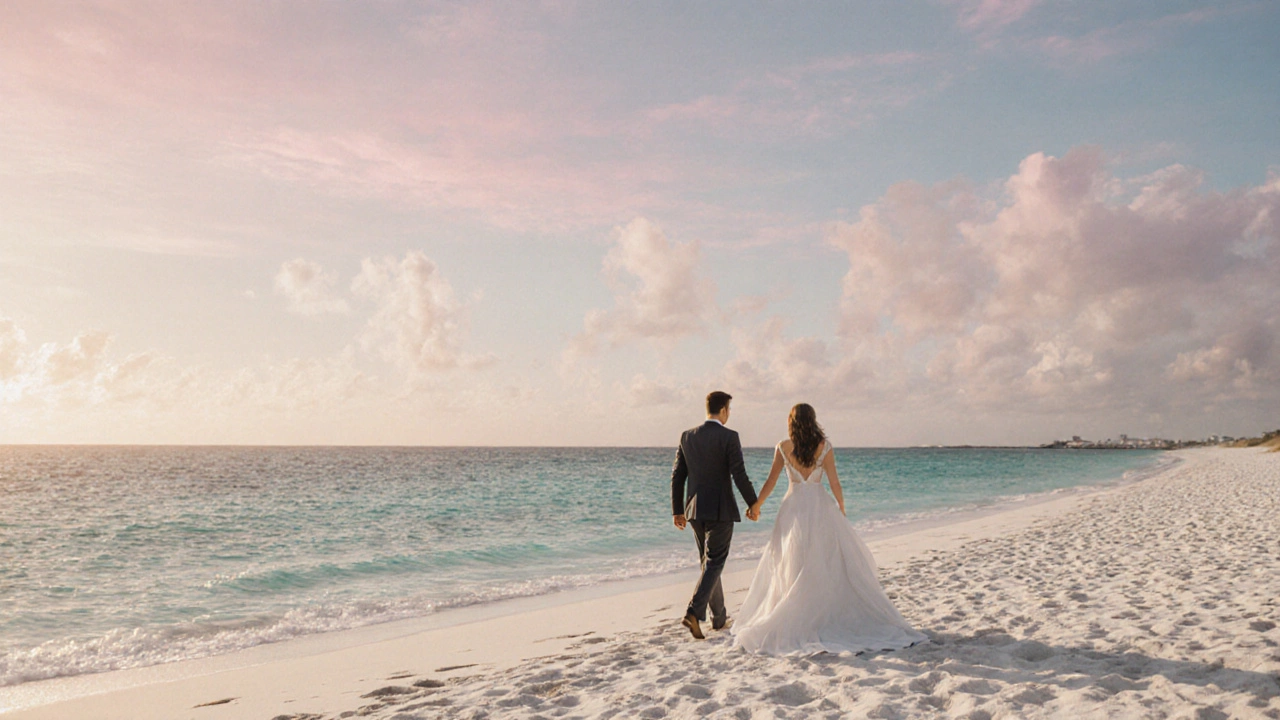Who Chooses Your Honeymoon Destination? A Practical Guide for Couples

Honeymoon Destination Match Calculator
Your Preferences
When you’re fresh out of the wedding ceremony, the first big question isn’t "what’s for dinner?" - it’s honeymoon destination. Who gets to pick? The answer can set the tone for the whole trip, and even the marriage, if you’re not careful. Below is a no‑fluff, real‑talk guide that untangles who should decide, how to involve both partners, and which tools keep the peace.
Understanding the Decision Landscape
Before you argue over Bali versus the Amalfi Coast, recognize that the decision belongs to a partnership, not a single person. In psychology terms, this is called decision‑making the process by which a couple arrives at a joint travel choice, balancing emotions, budgets, and expectations. Couples who treat the choice as a shared project report higher satisfaction during the trip and lower post‑trip regret.
Common Decision‑Making Styles
Every duo falls into a pattern, whether they know it or not. Here are the four most common styles:
- The Lead Planner - One partner (often the bride) does most of the research and makes the final call.
- The Equal Partner - Both spouses sit down, compare notes, and vote on every detail.
- The Delegator - The couple hands the task to a travel agent a professional who curates itineraries based on the couple’s preferences and budget or a friend.
- The Randomizer - They flip a coin, use a quiz app, or let a Pinterest board a visual collection of travel images that inspire destination ideas decide.
Identify which style fits you early; it saves countless hours of scrolling and second‑guessing.
Factors That Influence Who Picks
Even within a style, concrete factors shape who ultimately names the place:
- Travel budget the total amount a couple is willing to spend on flights, accommodation, and experiences. If one partner controls the finances, they often have the final say.
- Travel style the type of vacation a couple prefers, such as adventure, relaxation, cultural immersion, or luxury. A thrill‑seeker may push for New Zealand, while a beach lover leans toward the Maldives.
- Destination type the overarching category of a location-beach, mountain, city, or safari. Knowing this helps narrow the list quickly.
- Time off the amount of vacation days each partner can take, which influences travel distance and length. One partner may have only a weekend, steering the choice toward a nearby spot.
- Online planner a digital tool or app that aggregates flight prices, accommodation, and activities in one place. Some couples let the app generate a ranked list, then decide together.
Write these factors on a shared Google Doc and rank their importance. The highest‑scoring factor often predicts who will have the strongest voice.

Tools & Resources to Aid the Choice
Technology can turn a heated debate into a fun game. Below is a quick rundown of the most useful aids:
- Trip‑matching quizzes - Websites like Travefy or Honeymooner ask about climate preference, activity level, and budget, then spit out a shortlist.
- Travel blogs - Real‑world stories from couples who’ve been there. Look for posts that detail costs, pros, cons, and hidden gems.
- Social media boards - Pinterest boards titled "Honeymoon ideas" often categorize destinations by season and price.
- Budget calculators - Apps such as Trail Wallet let you plug in daily expenses and instantly see if a destination fits your financial plan.
Combine at least two sources so you get both objective data and personal anecdotes.
Practical Checklist for Couples
Grab a pen or a shared note app and tick these boxes together:
- Define your budget ceiling - include flights, accommodation, meals, and a 10% buffer.
- Agree on a travel style - adventure, relaxation, culture, or a mix.
- Identify the ideal climate for your wedding month.
- Set time constraints - total days and any visa requirements.
- Choose a decision‑making style - lead planner, equal partners, delegator, or randomizer.
- Run a quick quiz on two different platforms and compare results.
- Shortlist three destinations and assign each a score for budget, vibe, and logistics.
- Discuss the scores openly; if the gap is small, let a coin flip decide - the fun is in the journey, not the math.
When you’re done, you’ll have a clear, mutually‑approved destination without lingering resentment.

Real‑World Stories
Here are three couples who navigated the choice differently:
- Emma & James - Emma loved beaches, James wanted culture. They used a travel blog ranking system and landed on Lisbon, which offered historic neighborhoods and gorgeous cliffs. Both felt heard.
- Aisha & Raj - Raj earned most of the income, so he handled the budget. He chose a budget‑friendly hill station in Himachal Pradesh, matching Aisha’s love for nature. Their transparency about money prevented arguments.
- Liam & Zoe - They delegated everything to a boutique travel agent who curated a private island resort in the Seychelles. The agent’s expertise saved them time, and the surprise element kept the romance alive.
Notice the pattern: success comes when couples align decision power with each partner’s strengths and preferences.
Bottom Line - Share the Power
There’s no universal rule that says the bride, the groom, or a third‑party should always decide. The sweet spot is a balanced approach that respects budget control, travel style, and personal interests. By using the checklist, leveraging modern tools, and communicating openly, you turn the "who picks?" question into a bonding experience.
| Who Decides | Typical Strengths | Potential Pitfalls |
|---|---|---|
| Bride | Often more detail‑oriented, may research accommodations extensively | Risk of overlooking budget constraints if not coordinated |
| Groom | May focus on flight deals and adventure activities | May underestimate romantic ambience needs |
| Both (Equal) | Balanced perspective, shared excitement | Can lead to decision‑fatigue if not structured |
| Travel Agent | Professional expertise, time‑saving | Potentially higher cost, less personal touch |
Should the bride always pick the honeymoon spot?
No. While some couples prefer the bride to lead, the best choice is the one that fits both partners’ budgets, interests, and time off. A shared decision often creates a more satisfying experience.
What if we can’t agree on a destination?
Try the "equal partner" method: each of you creates a shortlist of three places, assign a score for budget, vibe, and logistics, then add the scores. If the totals are close, let a fun mechanism-like a coin flip or a random quiz-pick the winner.
How much should we budget for a honeymoon?
A common rule is 10‑15% of your annual household income, but it really depends on the destination’s cost of living, travel season, and the level of luxury you desire. Use a budget calculator to map out flights, accommodation, meals, and a 10% buffer for unexpected expenses.
Can a travel agent really help with honeymoon planning?
Yes, especially if you’re short on time or want a bespoke experience. Agents can negotiate better rates, handle visas, and suggest hidden gems that typical online searches miss. Just compare their fees against the value they add.
What online tools work best for narrowing down destinations?
Combine a quiz site like Honeymooner with a budgeting app such as Trail Wallet. The quiz narrows preferences, while the budgeting app checks affordability. Cross‑checking both gives a realistic shortlist.
